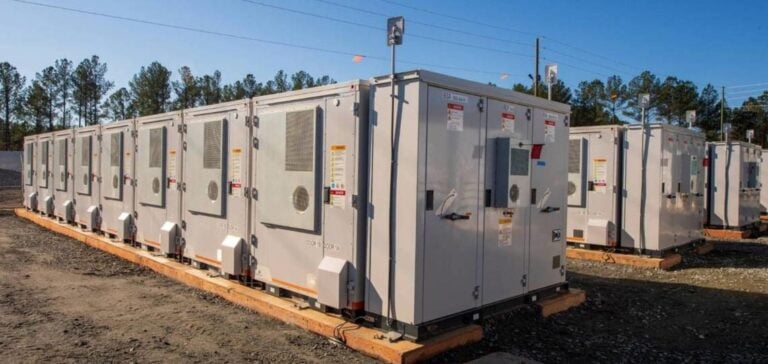Georgia Power identifies sites for 500 MW of new battery energy storage capacity (BESS) approved by the Georgia Public Service Commission (PSC) in its 2023 Integrated Resource Plan (IRP) update.
The plan calls for the installation of four-hour storage systems to stabilize energy supply and improve peak demand management, particularly during the winters of 2026/2027.
The selected sites leverage existing infrastructure to reduce development costs and accelerate deployment.
The projects include Robins BESS (128 MW) in Bibb County, adjacent to Robins Air Force Base, and Moody BESS (49.5 MW) in Lowndes County, near Moody Air Force Base.
These facilities share solar generation infrastructure, eliminating the need for new transformer substations and limiting the expense of interconnections and grid upgrades.
Optimization of costs and existing infrastructure
By reusing existing sites, Georgia Power avoids additional investment in transmission infrastructure and minimizes implementation times.
For example, the Hammond BESS project (57.5 MW), located on the site of the former Plant Hammond coal-fired power plant in Floyd County, uses transmission capacity already available, offering a cost-effective alternative for meeting generation capacity requirements.
These installations also bring economic benefits in terms of energy arbitrage.
Storage systems shift energy production to periods of high demand and high marginal costs, optimizing grid utilization and generating savings for consumers.
Enhanced system reliability and operational flexibility
BESS systems are essential for enhancing grid resilience, in particular by improving the management of fluctuations in production and consumption.
By storing surplus energy, particularly from renewable sources such as solar, and re-injecting it when demand is higher, these systems contribute to the balance and stability of the power grid.
Georgia Power’s approach, based on the use of existing infrastructure and ready-to-deploy projects, ensures the operational flexibility required to meet future energy needs.
In addition, projects benefit from the tax incentives of the Inflation Reduction Act, which reduce overall development costs and, consequently, customer tariffs.
Progress on current projects and outlook
In addition to these new facilities, Georgia Power is making progress on other storage projects.
The Mossy Branch Battery Facility (65 MW) in Talbot County is nearing completion and represents the company’s first BESS initiative, approved in the 2019 IRP.
In addition, the McGrau Ford Phase I BESS project (265 MW), validated in 2022, is scheduled to enter service by the end of 2026, consolidating the company’s strategy to diversify its generation portfolio and improve grid reliability.
Georgia Power continues to invest in energy storage solutions to adapt to the changing dynamics of the electricity market, while optimizing operating costs through strategic choices and efficient resource management.





















